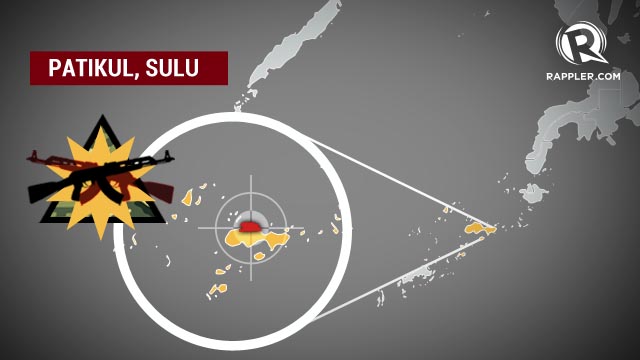SUMMARY
This is AI generated summarization, which may have errors. For context, always refer to the full article.

MANILA, Philippines – A military assault on the Abu Sayyaf Group in southern Philippines entered its 5th day on Saturday, February 28, with the toll rising to 24 guerrillas and two soldiers dead, officials said.
Ten Abu Sayyaf militants were killed in a two-hour clash on Friday, February 27, after the army pounded their jungle lair on Jolo island with artillery and helicopter gunships, said Colonel Alan Arrojado, who is leading the assault.
Another 14 rebels and two troops had been killed since the fighting erupted on Tuesday, February 24, he said.
Battles were raging in the mountainous and thickly forested villages of Patikul town, an area controlled by Abu Sayyaf, a group of a few hundred gunmen with links to the Al-Qaeda network.
The militants were reportedly moving with 3 Malaysian Jemaah Islamiyah members who were providing them with training on how to make bombs, military spokesman Colonel Restituto Padilla told Agence France-Presse.
“This (assault) will not stop until we put an end to the Abu Sayyaf,” Padilla said.
The Malaysians have been “monitored for some time,” he said.
Hostages
The Abu Sayyaf in the past have harbored JI militants, including Umar Patek and Dulmatin, key suspects in the 2002 Bali nightclub bombings that killed 202 people.
The group is currently holding at least 7 hostages, according to the military.
A German couple that they had held captive for 6 months were freed in October last year with the bandits claiming they were paid P250 million ($5.7 million) in ransom.
Despite receiving training assistance from the United States, the Philippines has struggled to contain the Abu Sayyaf, whose leader last year pledged allegiance to the Islamic State.
Founded in the 1990s with seed money from Al-Qaeda, the Abu Sayyaf gained international notoriety for kidnapping foreigners for ransom.
The hefty ransom payments enable the group to fund attacks and replenish its forces from impoverished Muslim communities in southern regions of the largely Catholic Philippines.
The group was also blamed for the worst terror attack in the country, the 2004 firebombing of a ferry off Manila Bay that killed more than 100 people. – Rappler.com
Add a comment
How does this make you feel?
There are no comments yet. Add your comment to start the conversation.